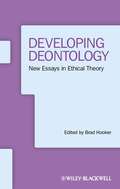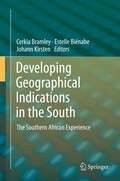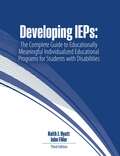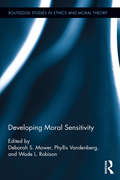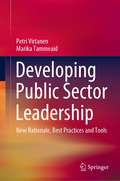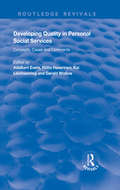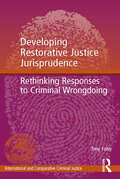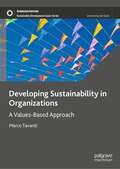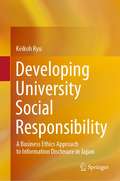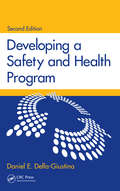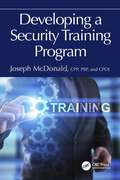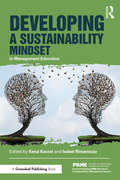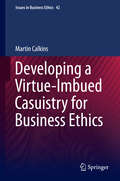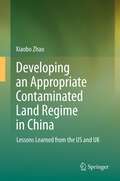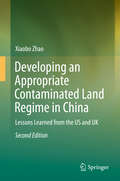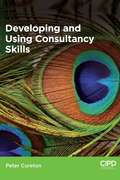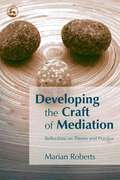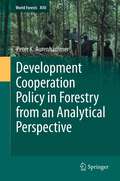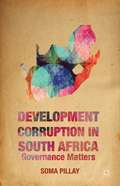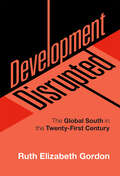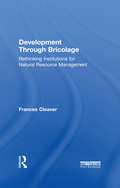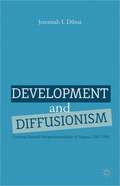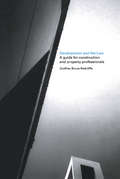- Table View
- List View
Developing Countries in the Gatt Legal System
by Robert E. HudecIn this reissued edition of the classic work Developing Countries in the GATT Legal System, Robert E. Hudec's clear insight on the situation of developing countries within the international trade system is once again made available. Hudec is regarded as one of the most prominent commentators on the evolution of the current international trade regime, and this long out-of-print book offers his analysis of the dynamics playing out between developed and developing nations. A significant contribution when the book was first published, this work continues to serve as a thoughtful and important guide to how current and future trade policy must seriously adapt to the demands of the developing world. This new edition includes a new introduction by J. Michael Finger that examines Hudec's work to understand how the GATT got into its current historical-institutional predicament and the lasting impact of his work on current research on international trade systems.
Developing Deontology: New Essays in Ethical Theory (Ratio Special Issues #14)
by Brad HookerDeveloping Deontology consists of six new essays in ethical theory by leading contemporary moral philosophers. Each essay considers concepts prominent in the development of deontological approaches to ethics, and these essays offer an invaluable contribution to that development. Essays are contributed by Michael Smith, Philip Stratton-Lake, Ralph Wedgewood, David Owens, Peter Vallentyne, and Elizabeth Harman - all leading contemporary moral philosophers Each essay offers an original and previously unpublished contribution to the subject A significant addition to the field for anyone with an interest in the development of deontology The collection is edited by a leading philosophical scholar
Developing Geographical Indications in the South: The Southern African Experience
by Cerkia Bramley Estelle Bienabe Johann KirstenThis book contributes to the literature on Geographical Indications (GIs) by providing key theoretical reflections from a five-year review process on the potential of GIs for agri-food products in Southern Africa. The contributors reflect on diverse GI processes and dynamics which operate at the local, national and international levels, thus enriching the understanding of GI dynamics and of the variety of policy options available for GI protection in Southern countries. Following a discussion of the legal framework and governance of national GI schemes in Southern countries, the book emphasizes the main dimensions underlying the development of GIs and their potential for enhancing sustainable rural development and market access in particular. This provides the structure for the chapters that build on the different experiences of Southern African industries that have embarked on GI strategies. The book includes chapters on designing an appropriate legal framework and governance system for the development of GIs in Southern countries.
Developing IEPs: The Complete Guide to Educationally Meaningful Individualized Educational Programs for Students with Disabilities
by Keith J. Hyatt John FillerThis book focuses on the IEP process from both procedural and substantive perspectives as it relates to students from 3 through 21 years of age (information is congruent with the 2017 U. S. Supreme Court decision in Endrew F. v. Douglas County School District). The text stresses the interrelated aspects of IEPs, continuing to mention and discuss its various components as the text progresses. Filled with practical material that readers can immediately apply, Developing IEPs provides a valuable reference that helps students demystify the subject both in and out of the classroom. The Second Edition of Developing IEPs includes: reproducible forms, hyperlinks for important resources, checklists to ensure you develop educationally relevant and legally compliant IEPs, updates on IEP team responsibilities for bullying and harassment, extensive coverage of postsecondary transition planning.
Developing Moral Sensitivity (Routledge Studies in Ethics and Moral Theory)
by Wade L. Robison Deborah Mower Phyllis VandenbergMoral sensitivity affects whether and how we see others, note moral concerns, respond with delicacy, and navigate complex social interactions. Scholars from a variety of fields explore the concept of moral sensitivity and how it develops, beginning with a natural moral capacity for sensitivity towards others that is shaped in a variety of ways through relationships, forms of teaching, and social institutions. Each of these influences alters the capacity as well as one’s responses in complex ways. The concept of moral sensitivity deepens as progressive chapters demonstrate its increasing complexity through development within individuals, over time, as they mature, and as their relationships and social contexts expand. The chapters integrate research from philosophy, psychology, neuroscience, literature, education, and media and technology studies, with key chapters by Darcia Narváez, Nancy E. Snow, Michael S. Pritchard, and Stephen J. Thoma and a Foreword by Owen Flanagan. It is the only comprehensive presentation of interdisciplinary work on moral sensitivity that integrates a theoretical, methodological, and pedagogical analysis. This highly interdisciplinary approach provides a new way of thinking about the relationship of individuals to society and moral sensitivity as a social phenomenon, extending current research in ethics, moral psychology, and psychology toward situated, embodied, and contextual analyses.
Developing Public Sector Leadership: New Rationale, Best Practices and Tools
by Petri Virtanen Marika TammeaidThis book presents tools, techniques, and best practices to develop public-sector leadership. Based on scholarly research as well as the authors’ professional experience as leadership trainers and consultants, it offers guidance and practical know-how for public-sector managers, civil servants and policymakers in public administration on how to create and develop leadership skills and practice. By analyzing the particular nature of political processes and public policy decision-making as well as the complex challenges of public organizations, the authors identify competencies, leadership skills and methods required for successful governance, administration, and management of public organizations. The authors also discuss different leadership styles and philosophies, cover topics such as public sector leadership training of 2020’s, and present case studies on successful public-sector leadership development and future-oriented leadership models. Balancing public-sector leadership theory with practical illustrations and examples, tools and techniques, the book helps managers master the art of public-sector leadership.
Developing Quality in Personal Social Services: Concepts, Cases and Comments (Routledge Revivals)
by Adalbert Evers Kai Leichsenring Riitta Haverinen Gerald WistowFirst published in 1997, this volume is about the challenge of introducing business-originated concepts of quality assurance, personal social services are currently confronted with all over Europe. Undoubtedly, the new orientation towards a more business-like approach in social welfare settings will raise professionalism, "client-orientation" and controlling (instead of mere inspection). There is evidence, however, that the specificities of personal social services are not always taken into account if it comes to introducing market values and mechanisms. Due to this development it becomes essential to promote more adequate criteria for quality standards in the very field of personal social services. The challenge is to maintain a certain standard of service provision while at the same time reconsidering the preconditions for defining quality. This will imply the search for a consensus between allegedly diverging approaches, i.e. between their different basic concepts, aims and standards. Given the social and economic context within which these developments are taking place, the focus of the contributions is on their critical assessment in different European countries. An overview is given about national developments in the areas of care for older persons and other social services. The contributors from Austria, Belgium, Denmark, Finland, Germany, Italy, the Netherlands, Norway, Sweden, and the UK look at how and by whom quality is defined and what challenges the actors of the traditionally mixed economy of personal social services are meeting. Empirical evidence about user involvement and satisfaction is given but also theoretical reasoning about the impact of business approaches on a "pubic good". Thus, the book tries to fill an important gap in practice, research and policy-making concerning personal social services and quality issues.
Developing Restorative Justice Jurisprudence: Rethinking Responses to Criminal Wrongdoing (International and Comparative Criminal Justice)
by Tony FoleyWhat are the requirements for a just response to criminal wrongdoing? Drawing on comparative and empirical analysis of existing models of global practice, this book offers an approach aimed at restricting the current limitations of criminal justice process and addressing the current deficiencies. Putting restoration squarely alongside other aims of justice responses, the author argues that only when restorative questions are taken into account can institutional responses be truly said to be just. Using the three primary jurisdictions of Australia, New Zealand and Canada, the book presents the leading examples of restorative justice practices incorporated in mainstream criminal justice systems from around the world. In conclusion, the work provides a fresh insight into how today’s criminal law might develop in order to bring restoration directly into the mix for tomorrow. This book will be of interest to undergraduates, postgraduate researchers and lecturers, as well as lawyers who work in the field of criminal law, criminologists, social scientists and philosophers interested in ideas of wrongdoing and criminal justice responses to criminal offending.
Developing Sustainability in Organizations: A Values-Based Approach (Sustainable Development Goals Series)
by Marco TavantiThis book explores the historical, foundational, and applied elements of sustainability theory and practice as relevant to the leadership, management, and innovation of organizations, companies and enterprises. It provides analytical and critical reviews of the current evolution of sustainability for people, planet, prosperity, innovation and impact.Divided into four parts, the work offers an integrated model of development for creating and delivering sustainability values at the personal, organizational, societal and environmental levels. The different sections examine sustainability leadership (focusing on of ethics, values, and purpose), sustainability management (focusing on organizational effectiveness and stakeholders’ wellbeing), sustainability innovation (focusing on social and environmental entrepreneurship), and sustainability impact (focusing on resilience, interconnectedness, consciousness, systemic thinking, and cosmic empathy for the common good and common future).Combining theoretical and practical applications that give the reader a deeper, scientific, and critical understanding of the urgent, complex, and necessary values for a sustainable future for all, this comprehensive text is a must-read for researchers and students alike, providing a framework for effective globally responsible leadership.
Developing University Social Responsibility: A Business Ethics Approach to Information Disclosure in Japan
by Keikoh RyuThis book analyzes the growing importance of information disclosure in Japanese universities in the context of the country’s changing circumstances from both a macroscopic and microscopic perspective, with a focus on the concept of universities as organizations. This macroscopic analysis is based on available data concerning the various information disclosure practices of Japanese universities and includes a discussion of their strengths and weaknesses. As for the microscopic analysis, questionnaires and various other quantitative methods have been used to study overall satisfaction with the level of disclosure among students and teachers in public and private universities, including differences between Japanese and Chinese students. The results of these surveys have then been analyzed to identify the main factors informing students’ views on the subject. Finally, additional insight into the practice of information disclosure in Japanese universities has been provided in a series of representative case studies, which should help promote further study concerning the practical applications of such disclosure. Based on the above analysis, this book proposes a social responsibility-based approach to university information disclosure, which incorporates stakeholder theory-based identification of public information content, an underlying focus on disclosure as a means to realize universities’ social responsibilities, identification of the types of information that universities should seek to disclose, recommendations for developing a framework for the systematic disclosure of such information, and recent disclosure trends. As part of this approach, recommendations concerning the arrangement of different sources of information, thoughts on building a publicly accessible platform for sharing university information, and key points underlying the systematic disclosure of information within universities are also proposed. Finally, this book is helpful in identifying further areas of research, including but not necessarily limited to the ideas and legal principles underlying the construction of a university information disclosure system, the development of information disclosure systems based on social responsibility, and the development of various standards for the disclosure of information. The ideal approach would ensure that all stakeholders are provided with meaningful access to relevant information, and that transparency takes precedence over any competing considerations as part of an overriding effort to improve university administration and oversight.
Developing a Safety and Health Program
by Daniel E. Della-GiustinaReflecting changes in the field during the ten years since the publication of the first edition, Developing a Safety and Health Program, Second Edition examines the elements of a safety and health program and delineates how to incorporate them into an organization's safety efforts. It begins by defining safety policy and providing an overview of OS
Developing a Security Training Program
by Joseph McDonaldDeveloping a Security Training Program focuses on how to establish a comprehensive training program for a security department from the ground up. This book highlights formal curriculum development, consistent and continual training, and the organizational benefits including how such security training will be a value-add.It’s long overdue for the industry to revisit old security training models from the past — to both general staff as well as to the dedicated security staff and professionals within organizations — and examine and revamp such with a fresh perspective. Given the current, dynamic environment for businesses — and the threats businesses face — it is important that any such training consider all procedures and policies, and be fully integrated into the company culture. This includes maintaining an eye on budgetary and financial costs while recognizing the need to budget for more training resources to maintain resilience and adaptability to current challenges and future changes to the environment. There is only one way to prepare your staff and that is through comprehensive and consistent training.Developing a Security Training Program provides the blueprint and tools for professionals to provide ongoing, targeted, and comprehensive security training at a low, budget-friendly cost.
Developing a Sustainability Mindset in Management Education (The Principles for Responsible Management Education Series)
by Isabel Rimanoczy Kerul KasselWith an expanding awareness of the challenges of sustainability, featured more in the daily news than in higher education textbooks, scholars and faculty have been called to connect their syllabi to the ‘real world’. This book doesn’t just offer the ‘why’; it offers the ‘how’ through presenting the definition and model of the ‘sustainability mindset’ to help educators frame curricula to facilitate broad and deep systemic learning among current and future leaders. A sustainability mindset is intended to help individuals analyze complex management challenges and generate truly innovative solutions. The sustainability mindset breaks away from traditional management disciplinary silos by integrating management ethics, entrepreneurship, environmental studies, systems thinking, self-awareness and spirituality within the dimensional contexts of thinking (knowledge), being (values) and doing (competency). This book is aimed at professors, faculty members, instructors, teaching assistants, researchers and doctoral students in higher learning management education programs. Chapter contributors are all teaching professionals from programs around the world, who have been doing research and creating curricula, assessments, tools, and more for the students in their classes, and the book will be globally applicable.
Developing a Virtue-Imbued Casuistry for Business Ethics
by Martin CalkinsCasuistry, Virtue and Business Ethics brings together three important processes for business ethics: casuistry, virtue ethics and the business case method. In doing so, it considers the overlap and synergy of casuistry and virtue ethics, the similarities and differences of casuistry and the business case method and the relationships between emerging and well-established cases. The goal of the book is twofold: to provide a distinctly practical method for moral decision-making within the context of business and to illustrate how contemporary vexing issues are similar to those of the past and how they might be resolved satisfactorily.
Developing an Appropriate Contaminated Land Regime in China
by Xiaobo ZhaoLike all industrialized countries, China has encountered increasing problems with land contamination in recent years. Abandoned mining and manufacturing sites and obsolete industrial complexes, while also creating new polluting industrial enterprises, represent impending environmental threats. More importantly, a number of social and economic problems have developed and must be dealt with, in some cases urgently. Contaminated land laws and regulations have been established and have evolved in the US and UK and many other jurisdictions over the past few decades. These regimes have substantially influenced the relevant legislation in the context of numerous Asian and European countries and will inevitably benefit similar legislative efforts in China. This book is the first monograph that focuses on how China can learn from the US and UK with respect to contaminated land legislation and comprehensively illustrates how contaminated land law could be created in China. It will be of interest to academics and practitioners in environmental law in China, as well as the US and UK.
Developing an Appropriate Contaminated Land Regime in China: Lessons Learned From The Us And Uk
by Xiaobo ZhaoLike all industrialized countries, China has encountered increasing problems with land contamination in recent years. Abandoned mining and manufacturing sites and obsolete industrial complexes, while also creating new polluting industrial enterprises, represent impending environmental threats. More importantly, a number of social and economic problems have developed and must be dealt with, in some cases urgently. Contaminated land laws and regulations have been established and have evolved in the US and UK and many other jurisdictions over the past few decades. These regimes have substantially influenced the relevant legislation in the context of numerous Asian and European countries and will inevitably benefit similar legislative efforts in China. This book is the first monograph that focuses on how China can learn from the US and UK with respect to contaminated land legislation and comprehensively illustrates how contaminated land law could be created in China. It will be of interest to academics and practitioners in environmental law in China, as well as the US and UK.
Developing and Using Consultancy Skills
by Peter John CuretonDeveloping and Using Consultancy Skills supports students and practitioners in their understanding of the meaning of consultancy and the skills required in consulting in a learning and development context. It covers all the stages in the consulting process and provides guidance on engaging with the client, clarifying the nature of the issues, agreeing the research areas and analysing feedback. Developing and Using Consultancy Skills also includes essential coverage of common problems with client-consultation relationships and how to overcome these as well as discussion of ethics and consultant behaviour. Essential reading for anyone studying the intermediate CIPD L&D qualification, this guide will not only equip students for their studies, but also for their role as L&D professionals in the workplace.
Developing the Craft of Mediation: Reflections on Theory and Practice
by Marian Roberts"While there is no shortage of how-to books for mediators, works focusing on the voice of the mediator are rare. This book aims to fill that void by highlighting the perspectives of 16 mediators on a variety of topics, ranging from what motivates them to their different mediation styles and approaches." -Dispute Resolution Journal `I recommend this book to all mediators in whichever discipline they practise and with it the implicit challenge - to know and develop our craft.' -Resolution Newsletter, and www.resolution.org.uk The modern emergence of mediation represents the new and evolving application of an ancient and universal approach to settling quarrels. Mediation is now an established method of dispute resolution across a wide range of professional, workplace and social situations including the family, community, commercial, organisational, employment, environmental and international arenas. It is increasingly being applied to new legal, care and health sectors such as child abduction, child protection, housing and medical negligence. This book draws uniquely on the concrete knowledge and practice experience of leading mediators, working in a variety of fields, to inform contemporary debates and challenges. These practitioners reflect on the excitement, complexity, difficulty and satisfaction of their work as well as on the differences and commonalities within and across diverse fields of mediation practice. The book explores individual qualities and approaches, styles and models of practice, institutional frameworks and personal ideologies. Developing the Craft of Mediation is an essential aid for any mediator, and for other professionals wanting to enhance their understanding of the theory and practice of mediation.
Development Cooperation Policy in Forestry from an Analytical Perspective
by Peter AurenhammerAny reader eager to gain a comprehensive insight into forest development policy, praxis and reality shouldn't miss this excellent publication. Hard to find a comparable reading where the author is digging as deep into Forest Development Policy. The author discovered numerous highly relevant theories as well as inspiring cases about forests and people from around the world, focusing on 'change' rather than 'development' and on the role of various actors in creating or preventing 'change'. The exciting results uncover reality and lead to inspiring discussions on concepts of development cooperation. All individual theoretical arguments and empirical proofs are well based and shed light into the political process of Forest Development Policy. The book is an essential contribution to scholarly debate and research on forestry in the South, and its relations to development cooperation, for both, readers with theoretical and practice related interests.
Development Corruption In South Africa
by Soma PillayDevelopment Corruption in South Africa examines governance matters with a focus on corruption. This rich empirical body on governance variables and governance performance is a welcome addition to South African government literature.
Development Disrupted: The Global South in the Twenty-First Century
by Ruth Elizabeth GordonAlthough the impact of rapid technological change is often discussed in relation to the Global North, this book explores its effects on the development of the Global South. By tracing the discourse and practice of international development in the twentieth century, Ruth E. Gordon offers necessary context to current changes in the global hierarchy. The book explores the situation of the Global South within the international legal, political, and economic order, how current development discourse and practice engages modernization efforts, and how technology can bring about significant economic and societal change for middle and low-income nations. It offers a balanced account of the positive and negative impacts of technological change on the Global South, from mobile phones allowing access to knowledge to robotics reducing employment opportunities. This book demonstrates that, for the Global South, technology is making more things both conceivable and achievable.
Development Through Bricolage: Rethinking Institutions for Natural Resource Management (Earthscan Studies in Natural Resource Management)
by Frances CleaverWhy, despite an emphasis on 'getting institutions right', do development initiatives so infrequently deliver as planned? Why do many institutions designed for natural resource management (e.g. Water User Associations, Irrigation Committees, Forest Management Councils) not work as planners intended? This book disputes the model of development by design and argues that institutions are formed through the uneven patching together of old practices and accepted norms with new arrangements. The managing of natural resources and delivery of development through such processes of 'bricolage' is likened to 'institutional 'DIY' rather than engineering or design. The author explores the processes involved in institutional bricolage; the constant renegotiation of norms, the reinvention of tradition, the importance of legitimate authority and the role of people themselves in shaping such arrangements. Bricolage is seen as an inevitable, but not always benign process; the extent to which it reproduces social inequalities or creates space for challenging them is also considered. The book draws on a number of contemporary strands of development thinking about collective action, participation, governance, natural resource management, political ecology and wellbeing. It synthesises these to develop new understandings of why and how people act to manage resources and how access is secured or denied. A variety of case studies ranging from the management of water (Zimbabwe, India, Pakistan), conflict and cooperation over land, grazing and water (Tanzania), and the emergence of community management of forests (Sweden, Nepal), illustrate the context specific and generalised nature of bricolage and the resultant challenges for development policy and practice.
Development and Diffusionism
by Jeremiah I. DibuaThis book deconstructs the neopatrimonial paradigm that has dominated analysis of Nigerian and African development. It shows that by denying agency to Nigerian societies and devaluing indigenous culture and local realities, Eurocentric diffusionism played a significant role in the failure of development planning.
Development and the Law: A Guide for Construction and Property Professionals
by Godfrey Bruce-RadcliffeA gap has long existed between construction professionals – such as architects, engineers, quantity surveyors and consultants – and the property development process. The underlying development structures, expressed in terms of legal obligation and accountability, are all too little understood. This practical guide by a highly experienced lawyer identifies the role of the construction professional in a wider context and looks beyond their relationship with their immediate employer. It provides the development professional with an understanding of the many relationships involved in projects, both in terms of contractual obligation and duty of care. This encourages more effective communication between those involved, including joint venture partners, bankers, funders, landowners with an interest in the outcome and tenants.
Development of the Constitutions in China and the Visegrad States: A Comparative Perspective
by Lu DaThis book deals with the development of constitutional law in China and Visegrad states by employing a comparative perspective. It is the first time that the researcher compared the constitutional development in the China and the Visegrad states. It offers a few glimpses of development of constitution in the (former) socialist states to readers who are interested in the constitutional law or China–V4 relations. With the increased cooperation between China and V4 countries, this book gives the undergraduates in the university to think about the BRI and 17+1 network from a Chinese perspective. Last, compared to the previous works which mainly focus on North America and/or Western Europe, this book provides a new angle on comparative constitutional law.

